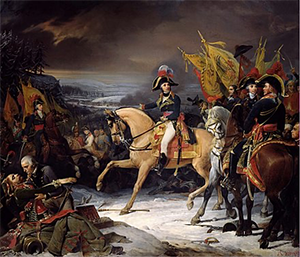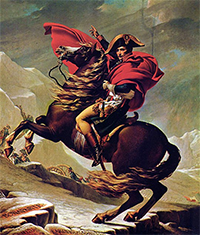The War of the Second Coalition
Part 3: Toward the End of the War
The two armies met on June 14 in the Battle of Marengo. Austrian forces numbered 30,000 men and 100 guns; French forces numbered 22,000 men and 15 guns. A surprise Austrian attack set the tone for the day. Bonaparte, thinking that the Austrians were instead retreating from the area, had dispatched elements of his force in other directions, anticipating entrapment. Consequently, as the battle unfolded, he was late in issuing orders. One of those was to recall Gen. Louis Desaix, whom he had sent some miles to the south, along with 6,000 men. The two sides traded fire throughout the day, and the Austrians got the better of things more than once, consistently pushing the French troops into retreat. Melas, slightly wounded and thinking the battle won, delegated command after issuing what he thought was the final order of victory. Instead, Desaix returned with his 6,000 men and initiated a counterattack, incorporating a heavy cavalry charge. It was enough to send the Austrians reeling and give the French the victory. 
That was the situation in Italy. In the north, Austrian and French armies still faced off in Germany and Switzerland. The French commander in the north was General of Division Jean Victor Marie Moreau (right), who by early 1800 commanded a force of about 137,000 men. By this time as well, the Austrian force, under Feldzeugmeister Pál Kray, numbered about 120,000. After a series of flanking maneuvers, Moreau and Kray fought each other to a standstill at Engen and then Moreau scored a victory at Stockach. The struggle continued in May and in the summer, French armies repeatedly assaulting Austrian positions but unable to break through. A French victory at Höchstädt in June forced an Austrian retreat to Munich and a further defeat forced a furthe retreat, to Ulm. The exhausted armies entered into protracted negotiations, punctuated by an Austrian change of command, Archduke John replacing Kray on the field and in the negotiations. John tried to press his advantage by advancing on Munich but was rebuffed. Moreau capped his successful campaign by decimating the Austrians at Hohenlinden on December 3 and marched on Vienna. It was then that the Austrians agreed to end their part in the war. As they always did, those negotiations took time and Austria and France signed the Treaty of Lunéville on Feb. 9, 1801. This was largely an affirmation of the two treaties that had ended the War of the First Coalition. France gained the Grand Duchy of Tuscany, and Austria agreed to recognize the independence of the Batavian Republic and the Cisalpine Republic. 
That left France at war with Great Britain, which by this time had become the United Kingdom. With Bonaparte in Italy, the U.K. forces under Sir Ralph Abercromby landed an invasion force in Egypt, in March 1801. They overran French positions first in Aboukir and then Canope, the French general Moreau fighting a series of rearguard actions that led to a U.K. siege of Alexandria itself. The U.K. force that surrounded Alexandria was about 20,000. Inside the city were 13,000 Frenchmen who outmanned, outgunned, and, by the summer, definitely out of provisions. The siege lasted just a few weeks, and Menou surrendered on September 2. It was at this time that the Rosetta Stone, discovered by French archaeologists the year before, changed hands and was carried away by soldiers of the United Kingdom. The U.K. naval blockade of France continued. Naval battles occurred in the Mediterranean but were nothing on the order of the Battle of the Nile. France and Britain were technically still at war, but representatives of both nations had signed a preliminary peace agreement in November 1801. After an extended period of hardline negotiations, both countries declared themselves satisfied enough and signed the Treaty of Amiens, on March 25, 1802. Thus ended the War of the Second Coalition. First page > From One War to the Next > Page 1, 2, 3 |
|
Social Studies for Kids
copyright 2002–2026
David White



 Bonaparte went himself to Italy, to take command of French forces there. The Austrians under Michael von Melas had besieged Genoa. In mid-May, the French army crossed the Alps via the Great St. Bernard Pass, still covered in snow. After subduing an advance Austrian cadre in the Aosta Valley, the French force seized Milan, Pavia, and other locations, in order to severe the lines of communication of the Austrian forces there. Because Bonaparte's force had not gone to Genoa to raise the siege, the French commander, Masséna, had no choice but to surrender, which he did, on June 4. The Austrians, meanwhile, were concentrating their forces in Alessandria.
Bonaparte went himself to Italy, to take command of French forces there. The Austrians under Michael von Melas had besieged Genoa. In mid-May, the French army crossed the Alps via the Great St. Bernard Pass, still covered in snow. After subduing an advance Austrian cadre in the Aosta Valley, the French force seized Milan, Pavia, and other locations, in order to severe the lines of communication of the Austrian forces there. Because Bonaparte's force had not gone to Genoa to raise the siege, the French commander, Masséna, had no choice but to surrender, which he did, on June 4. The Austrians, meanwhile, were concentrating their forces in Alessandria.


